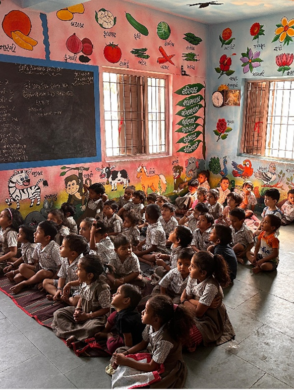Our Activities
Cities are complex systems. The components of urban systems, from food distribution networks and energy grids to transport and greenways, are interconnected and dynamic. Intervening to create change in any one of these components may impact others, creating systemic change. Designing solutions that take these interconnections into account is critical to sustainable development.
The five ICLEI pathways towards low emission, nature-based, equitable, resilient and circular development are designed to create systemic change. When these pathways guide local and regional development, urban systems becomes more sustainable. The pathways provide provide a framework for designing integrated solutions that balance the patterns of human life and the built and natural environments. They encourage holistic thinking. For instance, working together, the local and regional governments and global experts of ICLEI consider how nature-based development contributes to resilience, or how to bring equity into low emission development.
We design our work to integrate as many pathways as possible. Each individual pathway is multidimensional, incorporating numerous strategies for sustainable development. When more pathways are integrated into any given activity, such as a project, partnership or initiative, a greater degree of change can occur. Often, our activities are guided by a predominant pathway or set of pathways. In any given city or region, multiple activities may be implemented along each pathway.
This searchable digital collection of our activities worldwide includes technical resources, including digital platforms, methodologies and tools, as well as networks, projects, programs, partnerships, events and initiatives that guide action along the pathways, spark new partnerships and create city-to-city and city-to-region connections.
Each entry in this digital collection is marked with predominant pathways, keywords and related Sustainable Development Goals.
Through the Biodiversity Forum in Ulsan, ICLEI aims to develop and facilitate local driven policy action and raise citizen participation by co-planning, organizing and summarizing results together. Every year, biodiversity activists and NGOs participate and share their problems and solutions on chosen local biodiversity issues. This local Biodiversity Foru is a self-driven biodiversity event that […]
2019 Local Biodiversity Forum in Ulsan
ICLEI’s main activities in the project include: Taking the lead in transferring and customizing NBS, Co-developing NBS replication roadmap for FE, Co-developing the Urban NBS Plan along with the funding and investment strategies for FE, Co-developing the NBS implementation plan and opportunity-based implementation in FE districts and Launching a CLEVER Exchange Programme by organizing webinars, […]
Water should be a priority in the EU policies due to its importance for the economy, environment, and quality of life of the European citizens. ICLEI has created an alliance with 25 cities to prepare a framework for European cities with the objective of achieving a more coherent and thus more effective representation and visibility […]
European Union Water Policy Alliance Partnership
Through CitiesWithNature (CWN), local and regional governments are able to enhance the potential of nature to provide essential ecosystem services and solutions for the overall health of human habitats and urban areas. Through this platform, cities can engage, connect, learn, share, act, and inspire each other in the way of biodiversity and urban nature. ICLEI […]
ICLEI provides awareness raising and capacity building to all spheres of government in mainstreaming biodiversity, through guidance on vertical and horizontal integration to ensure successful implementation of biodiversity strategies and action plans (BSAPS); clarifies the role and contribution to be made at national, subnational and local level; and provide practical technical guidance to national, subnational […]
Vertical-Horizontal Integration and Subnational Implementation of NBSAPs
ICLEI supports the sub-national governments’ initiative on achieving Aichi Biodiversity Targets. Aichi Prefecture called for a group of leading sub-national governments showing significant efforts for achieving the Aichi Targets. The initiative was established during CBD-COP13 in Cancun, Mexico in 2016 and joined by a significant number of sub-national governments. ICLEI supported its launch and is […]
Group of Leading Subnational Governments towards Achieving the Aichi Biodiversity Targets
The goal of this project is to mainstream biodiversity, nature-based solutions and ecosystem management, seek recognition for these as cross-sectoral tasks and integrated them in subnational Biodiversity Strategy and Action Plans and sector plans in three model city-regions. ICLEI launched the four-year INTERACT-Bio project in three Global South countries: Brazil, India and Tanzania. ICLEI is […]
Using empirical research, ICLEI is developing a framework and tools to assess changes in food-water-energy nexus, their related trade-offs and the building of innovative capabilities in cities for developing innovative solutions to the food, water and energy nexus and manage green and blue infrastructure at the urban level. ICLEI is supporting the development of frameworks […]
Since 2008, ICLEI’s Cities Biodiversity Center (CBC) has convened successive summits as official parallel events to the Conference on Biological Diversity COP, to enable local and subnational governments engagement. These Summits have resulted in strong political outcomes, including the Quintana Roo (2016) and Sharm El-Sheikh (2018) Communiques, Nagoya Plan of Action on Subnational Governments, Cities […]
ICLEI Cities Biodiversity Center (ICLEI CBC)
Through the project, ICLEI will support 20 cities, with emission inventories, targets and guidelines for mitigation. It includes preparation of an inventory of GHG emissions and atmospheric pollutants; future emission scenarios for 5, 10, 20 and 40 years, with reduction targets; institutional implementation strategies and inventory review mechanisms; and training of RMC technicians in the […]
Greenhouse Gas Emissions Inventory for Campinas and the Metropolitan Region of Campinas















